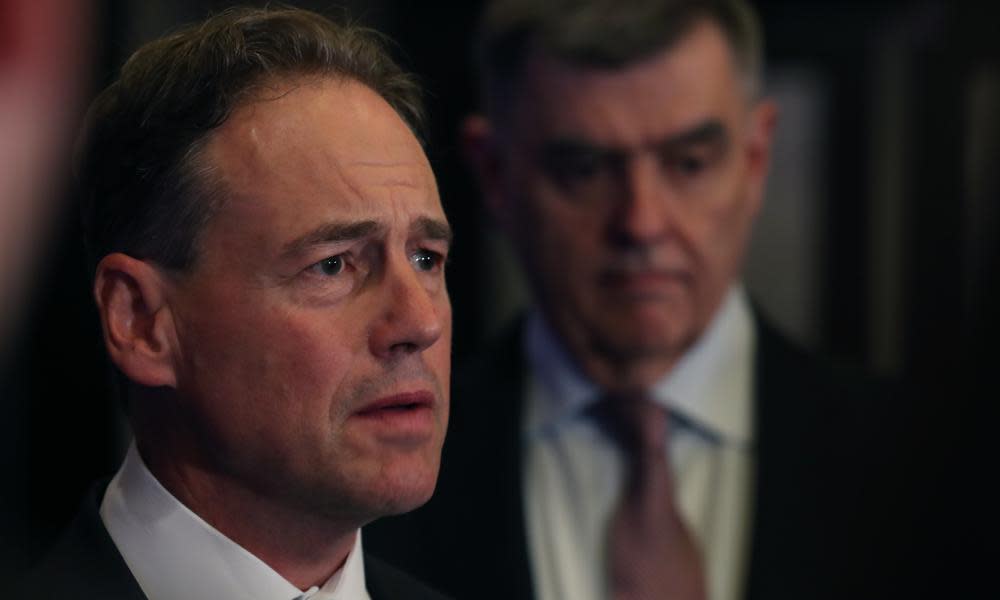'Very high risk': Australia adds Iran to coronavirus travel ban

From Sunday Australia will ban foreign travellers arriving from Iran, the country with the highest death rate from coronavirus outside of China.
On Saturday the health minister Greg Hunt said Iran’s struggle to contain the disease meant anyone who is not a permanent resident or citizen of Australia would not be allowed to come to Australia until 14 days after they had left Iran, meaning they would have to first go to another country. Australian citizens and residents would be allowed to return, but must self-isolate for 14 days. This lifts the travel advice to the same level as is current for China. As with China, Australians are being told not to travel to Iran.
There have now been 34 Covid-19 deaths in Iran, Hunt said.
“That’s been a very significant rise. That means there is likely at this stage a high level of undetected cases [in Iran],” he said. “Therefore those cases won’t be intercepted on departure from Iran. As a consequence we have decided to prevent travel to Australia for non-nationals.”
There is concern Iran is not sharing all the information it has on the virus, and that the actual number of deaths may be higher. Australia’s chief medical officer Prof Brendan Murphy said Australia could not continue to isolate Australia from every country struggling to contain the virus.
“But in this particular case we feel Iran presents at the current moment a very high risk,” he said. He added that Australians did not need to take extreme measures like stockpiling months worth of food or medical supplies. But he did say, “it’s becoming disproportionate and ineffective to keep imposing very rigid quarantine requirements for what could be a very large number of countries”.
In future, Australia would instead have to test and isolate people returning rather than imposing widespread quarantine measures, he said. The national security committee and the chief health officers of each state and territory are reviewing quarantine measures on a daily basis.
The decision comes as up to 40 customers of a hair and beauty salon in Queensland may have been exposed to coronavirus after an employee of a salon became ill with the virus after returning from Iran. The state’s chief health officer Dr Jeannette Young said there was an “incredibly low” risk the 63-year-old who had returned from Iran with the virus had passed it on.
“Because as soon as she had her first symptom, and she is a highly intelligent, very sensitive lady, she spoke to her manager and she went home and she went to Gold Coast University hospital to get tested,” Young said. “She came back from Iran, she was perfectly well on the flight back into Australia and up to the Gold Coast, and then a couple of days later she developed some symptoms.
Related: Explainer: how worried should I be about coronavirus in Australia?
“Queensland Health has very rigorous contact-tracing procedures in place and we do this very well dozens of times a year for measles, a disease significantly more infectious than Covid-19.”
Anyone who attended the Hair Plus salon on the Gold Coast on Thursday 27 February, after 11am, has been urged to come forward. Young said the woman performed facials on “a number of clients each for brief interactions” of about 15 minutes.
The woman is in a hospital isolation unit. She is the ninth person in Queensland infected with the virus, with 25 Australians infected to date. Of those, 15 have fully recovered with the rest in a stable condition.
The Queensland health minister, Steven Miles, said people who went to the area but did not go to that particular hair salon on Thursday did not need to be concerned. Gold Coast Health had established extra fever clinics to help manage demand for testing, he said.
“This patient will receive the very best care from the same team that treated Queensland’s first coronavirus cases,” he said.
Young said the best weapon Queenslanders could deploy against the virus was hand-washing.
The World Heath Organisation increased the risk of the spread of the disease to “very high”, with the number of countries now infected rising to 55.
“The continuing increase in the number of cases and number of affected countries over the last few days are clearly of concern,” WHO chief Tedros Adhanom Ghebreyesus said in Geneva. He said 24 Covid-19 cases had been exported from Italy to 14 countries and 97 cases had exported from Iran to 11 countries.
The UN health agency had previously labelled the global risk as “high” but was still not calling it a pandemic.

 Yahoo News
Yahoo News 
